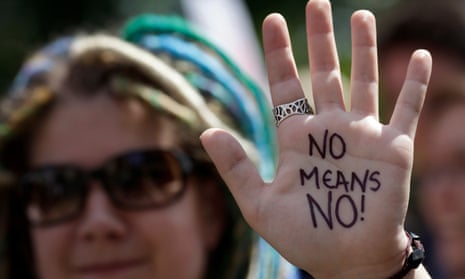Potential jurors hold “alarming” views about sexual violence, a major report into attitudes towards rape has revealed.
A survey commissioned by the End Violence Against Women Coalition found that a third of people in the UK think it isn’t usually rape if a woman is pressured into having sex but there is no physical violence.
Almost a quarter of the 4,000 people questioned in the Attitudes to Sexual Consent survey carried out by Yougov believed sex without consent in long-term relationships was usually not rape. Laws against rape in marriage have been in place since 1991.
The results came as Jeremy Corbyn warned that the country was facing a “rape crisis”, and as MPs welcomed a survivor of Rotherham’s child exploitation scandal to the Commons.
The report revealed a stark generational gap in attitudes – with more than a third of over-65s believing that in most cases sex without consent with your wife or partner was not rape, compared with just 16% of 16- to 24-year-olds.
This was a concern, the report said, because “many of the cases being reported to the police are younger women who have a clear view of consent, which may not be shared by many of the people who make up juries”.
Rachel Krys, the co-director of the End Violence Against Women Coalition, said that while the #MeToo movement had shone a light on the scale of sexual violence and encouraged more women to report rape, society and the criminal justice system was failing in its response.
“These figures are alarming because they show that a huge proportion of UK adults – who make up juries in rape trials – are still very unclear about what rape is,” she said.
“We know that 90% of women who are raped know the person who raped them but, for many British adults, the most commonly understood scenario is a single violent incident of rape committed by a stranger on a dark street. This could explain why juries are so reluctant to convict particularly younger men where consent is in question.”
Vera Baird, the victims portfolio lead for the Association of Police and Crime Commissioners, said: “These look less like mistakes of law and more like personal beliefs, which the survey suggests will be found across the population, in the police, crown prosecutors and judges. The recent 23% slump in CPS charges despite a huge increase in complaints of rape shows deep problems in a leading criminal justice agency which this survey may help to explain.”
In September, a freedom of information request from the Labour MP Ann Coffey revealed that less than a third of prosecutions brought by the Crown Prosecution Service (CPS) against young men result in a conviction.
The Yougov poll also exposed stark differences in attitudes towards rape between the sexes: while a third of men thought that if a woman had flirted on a date it wouldn’t be considered rape if she hadn’t explicitly consented to sex, this view was held by only 21% of women. A third of men also believed that a woman couldn’t change her mind after sex had started, compared with 23% of women.
“It is appalling that a third of men think if a woman has flirted on a date she is asking for it,” Coffey said. “These are all potential future jurors. Who would want their daughters and sisters judged by jurors holding these attitudes?”
The MP called for an urgent inquiry into the criminal justice system’s treatment of rape, including whether juries were the best way to deliver justice in such cases.
“Without such action, rape myths will continue to ricochet around the criminal justice system with terrible consequences for victims,” she said.
The total number of rapes reported to police has almost doubled since 2013-14, but the number of rape cases being charged by the CPS has plummeted by 23.1% to the lowest figure in a decade.
The report found that the majority of people, 69%, thought that if someone was raped a police investigation and court process would be available to the victim – a fact disputed by many rape complainants.
Max Hill, the new director of public prosecutions, has defended the steep decline in charging, but denied prosecutors were given targets to screen out weak cases, as reported in the Guardian.
The report also revealed a disconnect between the law on sexual violence – that sex without consent is rape – and the public’s understanding of rape. One in 10 people weren’t sure or didn’t think it was rape to have sex with a woman who was very drunk or asleep and 40% of people didn’t think “stealthing” – the practice of removing a condom without a partner’s consent or knowledge – was rape.
More than half of people thought a woman who had never had sex would suffer more harm from rape than any other woman who was raped, while 11% believed that a woman who had had a lot of sexual partners would be less harmed if she was raped compared with any other woman.
